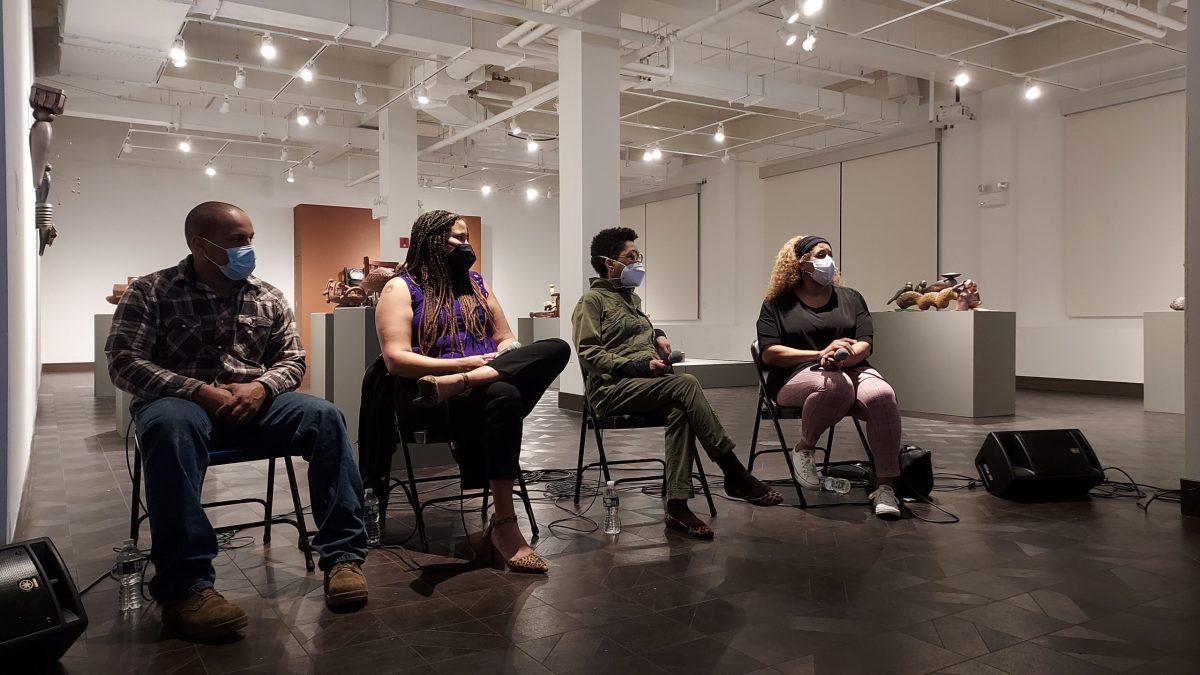On Tuesday, Feb. 22, Rowan’s Art Gallery held a panel discussion with local farmers in association with their latest exhibition “Earth Offerings: Honoring the Gardeners” by Syd Carpenter.
The panel included the artist herself, Syd Carpenter, founder and CEO of Bullock Garden Project, Sonya Harris; owner of Smith Poultry Kyle Smith; and founder of the non-profit C.R.O.P.S., Paige Vaccaro.
Each panelist began to discuss their relationship with the land and how it has transformed throughout the course of their lives. They all stressed the importance of engaging with the land and understanding that we would not be where we are today without the work of farmers.
Despite all the similarities, each speaker brought their own unique perspective on the issue of land and what it means to them.
For Syd Carpenter, the land meant inspiration. Her current exhibit at the gallery focuses on the history of Black farmers in America. Old fashioned clothespins, farm animals and the names of these farmers are scattered throughout her art pieces.
“The perception that African Americans have not been on the land is a misconception…In my research, I was really interested in how and who was still on the land after all the problems that confronted Black farmers,” Carpenter said. “Those folks who are still on the land, as these legacy farmers, men and women who have withstood all of the pressures… I think of them as heroes.”
She urged the audience not to forget the names of the Black farmers who brought with them the knowledge of how to grow a host of crops. These same people unfairly worked on the land without pay for years to create the foundation of American farming.
“Without Black people on the land there is no American economy,” Carpenter said. Readers are encouraged to check out more information about the message behind Carpenter’s art at The Whit Online.
Vaccaro spoke next, explaining her involvement with C.R.O.P.S.’s urban farming outreach. The program works to supply produce to South Jersey communities and teach them how to grow crops in unlikely places. It also includes access to multiple free gardens for those that may not otherwise have such healthy alternatives.
She spoke about how excited people were to see these fresh vegetables growing in their own communities. In order to entice others, she would ask passers-by if they would like to pick a vegetable from her garden to try. Nearly everyone took her up on that offer and was pleased with what they got.
She recounted a story in which she is attempting to teach an older man about how to cut collard greens so that they can grow again. In turn, he explained how the first cut was typically fed to the hogs because the second cut always tasted better.
“I’m not in Atlantic City to [just] teach people, I’m also there to learn and that’s a big part of it,” Vaccaro said.
Also on the board for C.R.O.P.S is local farmer and veteran Kyle Smith, who spoke about the importance of buying from your local farmers.
“Everybody’s got a doctor. Everybody should have a farmer,” Smith said.
Typically, your local farmer can not only provide you with fresh, pre-planned meat and produce, but can also provide you with a plethora of information.
If they give you a whole cow to store away, chances are they’ve cooked it themselves and can provide you with advice. Additionally, it’s possible they may know what herbs or parts of an animal you can use to heal yourself.
Along with supporting your community and access to information, buying from a local farmer can also help you cut down on bad eating habits.
“Grocery stores are going to give you a [serving] of bacon every time you walk in…[Buying from local farmers] is going to make you eat better because you’re limited on your choices,” Smith said. “There are only so many T-bones. There are only so many pieces of bacon… It changes your diet and the way you view food or eat food compared to what the grocery store has in our heads right now.”
Harris spoke last, engaging the audience in story after story about her experiences as a school teacher and how she got her students interested in gardening.
It began as a way to create a project that kids could come back to instead of learning about it once and not seeing the subject again for many years. As a result, she planned to plant tomatoes and have her kids conduct different activities, such as measuring its height as it grew.
This developed into a community garden: one that the children truly cared for. She went on to stress the importance of these gardens.
“All gardens need to be accessible to the people,” Harris said.“Because food insecurity doesn’t look like it did in 2018 when 40,000 families were facing food insecurity. It’s way over that. Food insecurity has a new face; it’s the middle class and upper-middle-class families.”
The speakers truly emphasized the importance of Black farmers, both then and now, and their relationship with the land while hoping to give audience members an increased appreciation for the land and understanding of the benefits we can reap from it. They encouraged everyone in the audience and the community to spread the word about all they had learned and to get some good dirt under their nails in the name of gardening.
For comments/questions about this story tweet @TheWhitOnline or email [email protected].

























































































































































!["Working with [Dr. Lynch] is always a learning experience for me. She is a treasure,” said Thomas. - Staff Writer / Kacie Scibilia](https://thewhitonline.com/wp-content/uploads/2025/04/choir-1-1200x694.jpg)









































